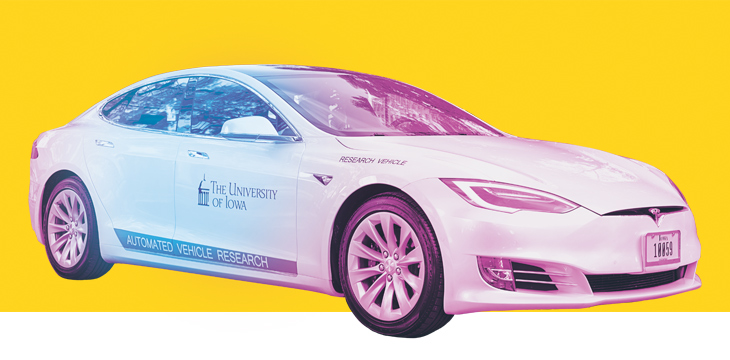Driving Innovation: Automated Vehicle Systems
 PHOTO: JUSTIN TORNER/UI OFFICE OF STRATEGIC COMMUNICATION
This Tesla is just one of the research vehicles used in the University of Iowa's Automated Vehicle Systems course.
PHOTO: JUSTIN TORNER/UI OFFICE OF STRATEGIC COMMUNICATION
This Tesla is just one of the research vehicles used in the University of Iowa's Automated Vehicle Systems course.
COURSE TITLE
Automated Vehicle Systems
INSTRUCTOR
Dan McGehee, director of the National Advanced Driving Simulator and associate professor of industrial and systems engineering
WHO TAKES IT
This industrial and systems engineering class gives UI seniors the chance to explore vehicle technologies and advanced driver-assistance systems, including everything from automatic emergency braking and adaptive cruise control to lane-keeping systems.
WHAT THEY LEARN
McGehee views the course—which covers historical perspectives, testing, policy and regulations, algorithm design, human factors, and the latest advances—as a simulated startup company and expects students to think like entrepreneurs. "I want them to behave as though they're working for Mercedes or Tesla," says McGehee. "I want them to know how to ask the right questions."
HOW THEY LEARN
Students spend one day behind the wheel of an automated vehicle at the National Advanced Driving Simulator on the university's Oakdale campus. This hands-on approach to learning extends into class assignments, which range from presenting weekly news updates about their assigned car companies to describing what a spy photographer might uncover at a competitor's business. In addition, these seniors hear from industry experts, including a lawyer specializing in automated vehicles and a former chief crash investigator from the National Transportation Safety Board. And just to keep things interesting, McGehee asks students to summarize a journal article in the form of a haiku.
WHY IT'S UNIQUE
The UI is at the forefront of innovations that could one day make self-driving cars a reality, which means students learn from a global expert in the field. McGehee heads up the UI's National Advanced Driving Simulator, the only one of its kind in the world. According to McGehee, today's automotive technologies emerged from UI research that was happening in the 1990s. "Toyotas have advanced driver assistance systems that came through us 25 years ago," he says. "You can go to a Toyota dealership right now and see technology we worked on at Iowa."
STUDENTS SAY
"Highly automated vehicles are a hugely disruptive and imminent innovation," says T. Zach Noonan (13BSE, 18MS), a graduate student who helped write the course and co-teaches it with McGehee. "However, it's important that engineers not only understand the technologies, but also appreciate the practical barriers currently inhibiting their widespread use."
